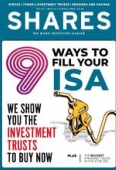Archived article
Please note that tax, investment, pension and ISA rules can change and the information and any views contained in this article may now be inaccurate.
How to get young people interested in finance

When it comes to saving and investing, the earlier you start the better – but getting young people interested in finance isn’t always easy.
Starting your investment journey at an early age has myriad benefits; your money has longer in the market to grow and can enjoy the benefits for compound interest for more years. Starting early also gets you into a great habit and makes investing an everyday concept rather than a scary commitment.
But when the interest rates on offer from banks and building societies are meagre and the stock market is tumbling, it can be difficult to explain to young people why saving is better than spending.
THE JOYS OF A SAVINGS JAR
Angela Lloyd Read, wealth adviser at Canaccord Genuity, is a big fan of giving pocket money and thinks putting coins in a jar and watching them build up while a child saves for that toy they want or for their holiday spending money is often more effective than employing the use of apps and technology.
She says: ‘Age-old solutions such as a reward chart for doing little chores or doing homework, where they can work towards a financial incentive, are invaluable.’
That said, she concedes that tech-savvy youngsters may often prefer a more high-tech option. She likes Go Henry, a prepaid card to which you can transfer pocket money for a child to use in the same way as a debit card. Parents can set spending limits through the app and check how the money is being spent.
It’s important to watch out for charges when you are using apps, however. Go Henry allows parents to make one free transfer of money to the account per month but charges per transfer afterwards, which can really add up if you dole out pocket money on a weekly basis or ad hoc.
Children are able to get a full debit card from a bank from age 11, which is free to use, but the downside is that they will be able to access all of the money in their account.
TALK ABOUT MONEY
Liz Alley, financial planning director at Brewin Dolphin, says that simply talking about money and being open about tricky subjects such as finance can help get young people engaged.
‘Many money worries arise either from a failure to think about the long-term or from unexpected events. By sharing your experience and knowledge, you can help your child be realistic about the future and make it easier for them to come to you for advice,’ she says.
But no matter how great a grounding you give your children in finance, it’s more than likely they will end up making a mistake or two along the way.
Pete Chadborn, director at financial adviser firm Plan Money, says it is important to let them make mistakes.
When his daughter was young and the family went on holiday, she was given her full two week’s spending money at the start of the trip to manage herself. He says: ‘She could spend it all on the first day or make it last the entire trip, but I was always very clear there was no more once it was gone.’
HAVING DIFFERENT SAVINGS POTS
He is a fan of the ‘three jars method’ for young children – encouraging them to split any birthday money, pocket money or earnings from chores across three pots: one each for spending, saving and sharing.
When she reached adulthood, he encouraged his daughter to maintain the principle and open three bank accounts: one for saving, one for bills and one for living expenses.
He says: ‘Often, when it comes to young people and finance, the best steps are the simplest. You aren’t born knowing this stuff and it’s not really taught at schools, so parents need to offer help where they can.’
JUNIOR ISA BENEFITS
Alley says setting up a Junior ISA for your child and getting them involved in the investment decisions for the account is a good place to start.
Parents and grandparents can use these accounts to save or invest up to £4,368 a year tax-free for their young relatives. Latest figures from HMRC show 907,000 of these accounts were opened in 2017/18.
But many parents fear that if they open a Junior ISA, their child will spend all the money they have so carefully saved over the years the moment they can access the account. Yet anecdotal evidence suggests that young people who are involved in the investment journey and aware of the account are more likely to keep it invested once they turn 18.
Research from AJ Bell found that just 7% of Junior ISAs were cashed in when the accountholder reached 18. Alley says: ‘Explaining the importance and value of money throughout their life will give children a better chance of making sensible decisions once they turn 18 and can access their Junior ISA. Discuss how the account is performing and what it could be worth by the time they are 18.’
Important information:
These articles are provided by Shares magazine which is published by AJ Bell Media, a part of AJ Bell. Shares is not written by AJ Bell.
Shares is provided for your general information and use and is not a personal recommendation to invest. It is not intended to be relied upon by you in making or not making any investment decisions. The investments referred to in these articles will not be suitable for all investors. If in doubt please seek appropriate independent financial advice.
Investors acting on the information in these articles do so at their own risk and AJ Bell Media and its staff do not accept liability for losses suffered by investors as a result of their investment decisions.
Issue contents
Big News
- The week's big news: Saga, Debenhams and more
- Funding Circle income fund to close after performance flop
- Brexit blamed for worst business investment figures since 2008
- Superdry shares still weak despite Dunkerton win
- Jupiter European funds downgraded as star manager set to step down
- Lack of IPOs is bad news for brokers

 magazine
magazine









